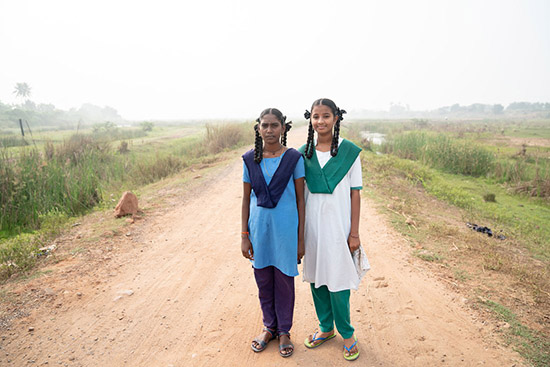谷歌在印度:希望、夢想和機(jī)遇
|
無論谷歌能否在印度賺得一分錢利潤,在諸如Thotlavalluru這類位于印度農(nóng)村腹地的村莊,,互聯(lián)網(wǎng)正在切切實(shí)實(shí)地改變著人們的生活,,并在這一過程中改變著印度自身——畢竟,外面的世界終于開始滲透到與世隔絕的偏遠(yuǎn)地區(qū),。一天清晨,,在距離Thotlavalluru村幾英里遠(yuǎn)的Pamula Lanka村,我站在甘蔗地之間,,一頭水牛邁著大步走過,。13歲的阿莎·西拉姆和15歲的索爾·武哈正騎著腳踏車,行駛在上學(xué)的土路上,,辮子在她們身后飛舞,。不經(jīng)意間,她們停在了我面前,?!澳闶敲绹藛幔俊彼齻兲伦孕熊?,睜大眼睛問道,。在這樣一個小村莊見到一位外國人,顯然讓兩位小姑娘萬分驚奇,。
我們之間的談話很快就轉(zhuǎn)到一件令人興奮的新事件上:上個月,,隨著家里購買了一部智能手機(jī),互聯(lián)網(wǎng)終于抵達(dá)阿莎的家中,。阿莎說:“我喜歡在WhatsApp上和朋友聊天,。”她解釋說,,她的英語水平足以使用這款即時通訊應(yīng)用,,但她的父母只會說泰盧固語,需要她的幫助才能在線交流,。自從她的父母幾周前首次上網(wǎng)以來,,“他們知道了一些關(guān)于村莊和城市的信息,甚至對美國也有所了解,?!彼@訝地說?!八麄兪怯霉雀鑱聿檎倚畔⒌??!?/p> |
WHETHER OR NOT GOOGLE makes one rupee of profit in India, it is in villages like Thotlavalluru, deep in rural India, that the Internet is most transforming lives—and in the process, India itself, as the outside world finally begins to pierce remote, isolated areas. At dawn one morning, in the tiny village of Pamula Lanka, a few miles from Thotlavalluru, I stand amid fields of sugarcane, with buffalo loping by, when Asha Seelam, 13, and Sole Vuha, 15, come pedaling down the dirt path on their way to school, braids bobbing behind them, and skid to a halt in front of me. “Are you American?” they ask with wide eyes, hopping off their bikes in wonder at the sight of a foreigner in their tiny village.
The conversation quickly turns to an exciting new event: The arrival of the Internet at Asha’s home the previous month, with the family’s purchase of its first smartphone. “I like to chat with my friends on WhatsApp,” Asha says, explaining that she knows enough English to use the messaging app, but that her parents, who speak only the local Telugu language, need her help to communicate online. Since her parents had first logged on to the Internet a few weeks earlier, “they know some information about villages and cities, even in America,” she says with amazement. “They use Google to find information.” |

|
那天下午,當(dāng)我來到她家的小房子時,,她的母親,、36歲的西拉姆·文卡特斯瓦拉姆瑪告訴我,她用谷歌地圖查看到印度教圣地的距離,。自從去年 11 月上網(wǎng)以來,,讓她最激動的事情莫過于在YouTube上觀看了一部用泰盧固語拍攝的印度電影。其主演是當(dāng)?shù)氐娜f人迷維賈伊·德維拉孔達(dá),。
阿莎的父親是一個農(nóng)民,,全家的年收入僅有區(qū)區(qū)800美元,這樣一家人對谷歌沒有任何商業(yè)價值,。但請忘記這個事實(shí)吧?,F(xiàn)在,這家人正在登陸免費(fèi)網(wǎng)站,,而不是在網(wǎng)上挑選度假計劃或購買衣服——未來幾年或許依然是這樣,。但對谷歌和其他科技公司來說,像阿莎這樣的家庭恰恰是印度互聯(lián)網(wǎng)圖景的生動寫照,。他們認(rèn)為,,這個市場是如此獨(dú)特,如此龐大,,值得用盡一切努力來挖掘它的潛力,。(財富中文網(wǎng))
本文另一版本登載于2019年3月刊的《財富》雜志,題目是《谷歌在印度的希望與夢想》,。 譯者:任文科 |
When I visit her small home that afternoon, her mother, Seelam Venkateswaramma, 36, who teaches in the one-room village schoolhouse, tells me she uses Google Maps to check distances to Hindu pilgrimage sites. Her greatest thrill since getting connected in November has been watching an Indian movie on YouTube, in Telugu, starring local heartthrob Vijay Deverakonda.
Forget the fact that Asha’s father, a farmer, and her mother together earn $800 a year and present no commercial value to Google. For now—and perhaps for years to come—the family is logging on to free sites, not shopping for vacations or clothes. But to Google and other tech companies, families like Asha’s are living proof of a phenomenon that they believe is so unique and so big that it merits trying all means possible to seize its potential.
A version of this article appears in the March 2019 issue of Fortune with the headline “Google’s Hopes and Dreams in India.” |













